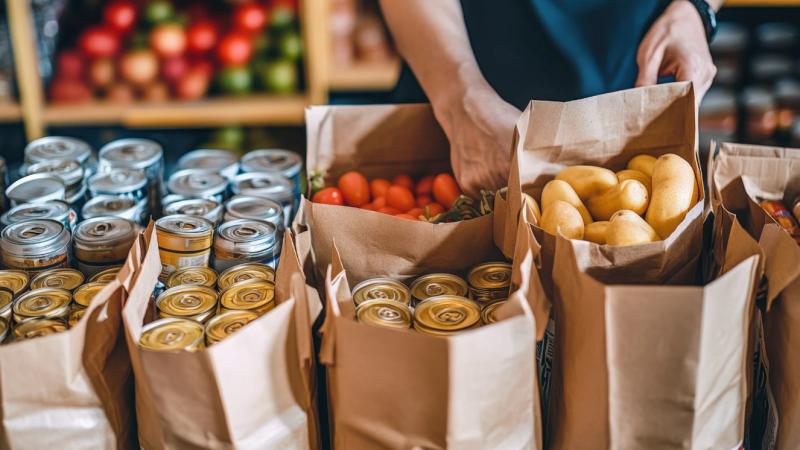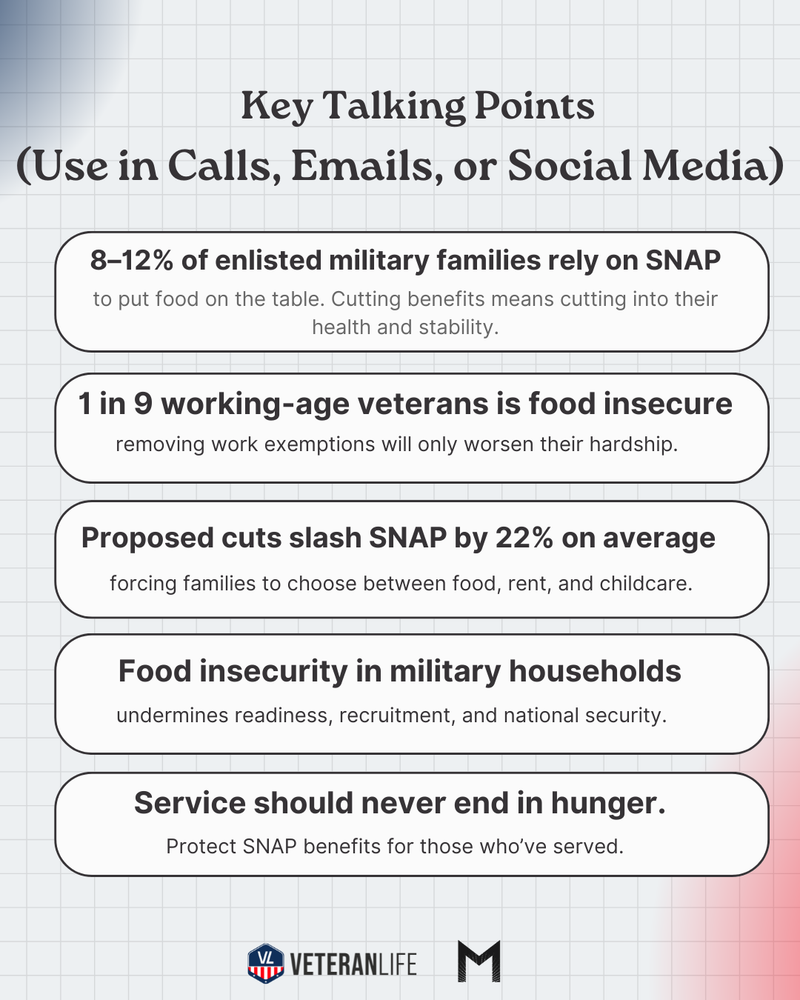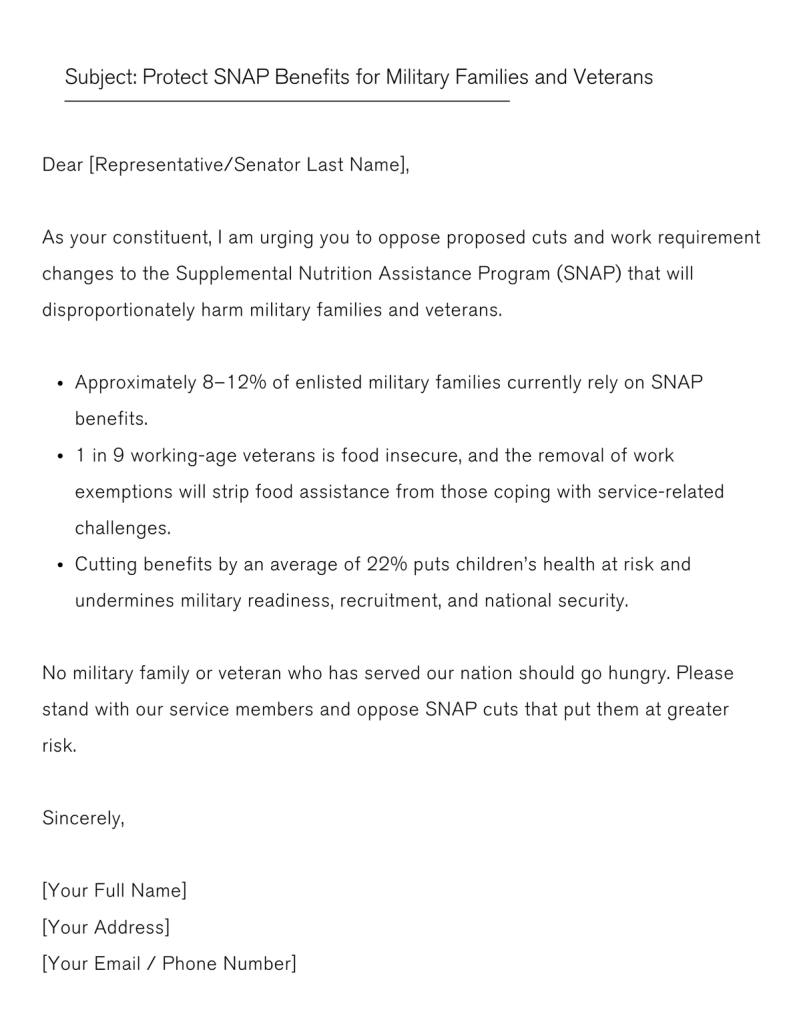SNAP CUTS IMPACT MILITARY FAMILIES AND VETERANS' FOOD SECURITY
COMMENT
SHARE

ADVERTISEMENT
The image of a military family often brings to mind strength, resilience, and sacrifice. What we don’t picture—what we rarely talk about—is a soldier’s child going to bed hungry, or a Veteran quietly skipping meals so their family can eat. Yet this is the reality for thousands of military households across America.
Behind the uniform are families who serve too, and many are struggling with something as basic as food. Nearly 1 in 8 enlisted families rely on food assistance through the Supplemental Nutrition Assistance Program (SNAP), and 1 in 9 working-age Veterans experience food insecurity.
These are not statistics from a distant past or another country—they are happening here, in the homes of the very people who have worn our nation’s cloth. And now, with sweeping cuts to SNAP on the horizon, the safety net that prevents hunger in these households is being pulled tighter than ever.
Food Insecurity Among Active Duty Military Personnel
Food insecurity is not just a civilian issue—it’s a growing reality inside our armed forces. A 2020 Blue Star Families survey revealed that 14% of enlisted active-duty families live with low or very low food security, far outpacing the 10.5% of U.S. households overall.
For many, SNAP (Supplemental Nutrition Assistance Program) is not a “handout” but a lifeline.
Roughly 8–12% of enlisted families qualify for and receive SNAP benefits—proof that even steady military pay cannot always keep pace with housing, childcare, and rising food costs.

Nobody Prepared You for Military Life
But we can help. Join over 100k spouses already getting the advice, resources, and military tea they need to thrive.
SNAP Eligibility Changes for Military Families 2023
Lawmakers are pushing forward with the most significant SNAP changes in decades:
- A freeze to the Thrifty Food Plan—slashing benefits by an estimated 22% per household.
- Historic funding reductions, projected at $187 to $300 billion over the next decade.
- Expanded work requirements that remove long-standing protections for vulnerable groups, including Veterans, the homeless, and foster youth aging out of care.
That’s a heavy lift for Veterans who may face mental or physical health challenges, difficulty adapting to civilian jobs, or discrimination. As one Veteran housing advocate put it:
“I’ve been out of work for eight months… I cannot get a job. Nowhere to live.”
For struggling military households, these cuts translate to empty plates, missed meals, and tough choices between nutrition and necessities.
Impact on Veterans: Loss of SNAP Food Assistance
One of the most troubling changes is the removal of Veterans’ exemptions from SNAP work requirements.
Starting in 2026, Veterans will be required to work, train, volunteer, or actively job-seek 80 hours per month to retain benefits. For Veterans coping with service-connected disabilities, PTSD, or difficulty reintegrating into civilian life, these requirements are not just burdensome—they’re punishing.
The new rules would penalize even those with 100% VA disability ratings, unless they can secure new documentation proving unemployment due to their service-connected disabilities—a challenge in itself.
At the very least, this creates an administrative maze that leaves many vulnerable to losing food support entirely and going hungry for an undetermined length of time.

Effects on Military Families' Food Security
Food shortages in the fridge become all too real. For families already struggling, a 22% reduction in benefits could mean choosing between healthy meals and other essential expenses. The impact of these cuts extends far beyond the dinner table.
Children’s development is especially at risk: inadequate nutrition is linked to delays in language, vision, and overall growth, among other long-term effects.
When children of service members suffer malnutrition, the ripple effects reach the future force itself.
Military readiness is imperiled. Retired Marine Maj. Gen. Juan G. Ayala warns that SNAP and Medicaid cuts weaken national security, as poor nutrition and health make many young Americans unfit for service—and the military loses strong, healthy recruits.
ADVERTISEMENT
Supporting Military Families: Actionable Food Security Steps
SNAP cuts aren’t set in stone. Citizens, advocates, and military supporters can play a role in protecting those who serve. Here’s how:
1. Contact Congress Directly
Call or write your representatives urging them to oppose SNAP cuts and support protections for Veterans and military families.
Use military-focused data (8–12% of enlisted households rely on SNAP) to make the case personal and powerful.
2. Elevate Military Voices
Share stories of military families impacted by food insecurity through local media, Veteran organizations, or advocacy campaigns.
Personal testimony makes the issue harder for lawmakers to ignore.
ADVERTISEMENT
3. Support Nonprofits on the Front Lines
Donate to organizations like Feeding America, Blue Star Families, and Military Family Advisory Network, which directly aid food-insecure military households.
4. Leverage Veteran and Spouse Networks
Encourage Veterans’ service organizations (VSOs) and military spouse groups to organize letter-writing campaigns and petitions targeting policymakers.
5. Vote With This Issue in Mind
Pay attention to candidates’ positions on food security, Veterans’ benefits, and military family support programs. Ballot choices directly shape SNAP’s future.
ADVERTISEMENT
Advocacy for Military and Veteran Food Assistance
Military families and Veterans already walk a tightrope between service and survival. Cutting the very food support that keeps them balanced isn’t just shortsighted—it’s unthinkable.
Policy must strengthen, not strain, those who have already borne the burden of care for our country. Cutting food support for military families and Veterans is more than bad policy—some believe it is a betrayal of service.
Hunger should never be a consequence of wearing the uniform. The voices of citizens, Veterans, and advocates together can ensure that the people who protect this nation are never left wondering where their next meal will come from.
Advocacy Toolkit: Safeguarding SNAP for Veterans and Military
Veterans, service members, and military families are facing real threats to their food security.
Here’s how you can take action to support them and influence change where it counts.

Sample Letter to Congress

How to Contact Your Lawmakers
- Find Your Representatives
- Find your Senators
- Call the U.S. Capitol Switchboard: (202) 224-3121 and ask to be connected to your representative’s office.
Organizations to Support & Amplify
- Blue Star Families
- Feeding America (Veteran & Military Hunger Programs)
- Military Family Advisory Network
Quick Actions You Can Take Today
- Call your representative’s office and share the talking points above.
- Copy and send the sample letter via email or online contact forms.
- Share statistics on social media with the hashtag #ProtectMilitaryFamilies.
- Donate to trusted nonprofits working directly with military families in need.
Hunger in the ranks is not inevitable—it’s preventable. By raising your voice, you can help ensure military families and veterans receive the dignity, support, and stability they deserve.
Suggested reads:
Join the Conversation
BY NATALIE OLIVERIO
Veteran & Senior Contributor, Military News at MilSpouses
Natalie Oliverio is a Navy Veteran, journalist, and entrepreneur whose reporting brings clarity, compassion, and credibility to stories that matter most to military families. With more than 100 published articles, she has become a trusted v...
- Navy Veteran
- 100+ published articles
- Veterati Mentor
ADVERTISEMENT
ADVERTISEMENT




